First Star Trek movie announced
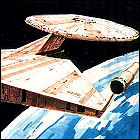 Having tried to find a suitable script for a big-screen relaunch of Star Trek virtually since the cancellation of the television series, Paramount – riding the coattails of the much-publicized unveiling of the Space Shuttle Enterprise – issues a press release announcing that the first Trek movie is finally underway – in this case, a still-in-development script called Star Trek: Planet Of Titans, featuring a radically redesigned Enterprise concept by illustrator Ralph McQuarrie, whose other recent genre work – designs for the yet-to-be-released Star Wars – has yet to make him a household name.
Having tried to find a suitable script for a big-screen relaunch of Star Trek virtually since the cancellation of the television series, Paramount – riding the coattails of the much-publicized unveiling of the Space Shuttle Enterprise – issues a press release announcing that the first Trek movie is finally underway – in this case, a still-in-development script called Star Trek: Planet Of Titans, featuring a radically redesigned Enterprise concept by illustrator Ralph McQuarrie, whose other recent genre work – designs for the yet-to-be-released Star Wars – has yet to make him a household name.
Star Trek: The God Thing
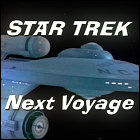 After spending a month writing drafts of the same basic story, Star Trek creator Gene Roddenberry completes the final draft of a live-action script simply titled Star Trek II, though later publications will refer to this script as The God Thing. The script shares many basic structural similarities with the later Star Trek: The Motion Picture, including sweeping upgrades to the Enterprise, Kirk’s promotion out of the captain’s chair, Spock’s return to Vulcan to pursue a purge of his human emotions, and an alien force of unknown power approaching Earth. There, however, the similarities end, as the story depicts an alien entity taking over the minds of Starfleet officers, who begin reciting prayers and exhibiting dangerous degrees of religious zealotry. Kirk and his senior officers, of course, remain unaffected, and disobey the orders of their possessed superiors to save Earth, only to discover that the “God” entity is an alien being which has been influencing human development for thousands of years, having last appeared in a guise which inspired the Judeo-Christian belief system. Likely out of fear of offending its potential audience, The God Thing is swiftly rejected by Paramount, though Bantam Books expresses interest in Roddenberry novelizing his own unused script. Work on that novelization comes to a halt in 1977 as Roddenberry begins work on a prospective Star Trek TV revival, and though other authors will attempt to adapt Roddenberry’s script – including Walter Koenig, Susan Sackett and Fred Bronson, and frequent Trek novelist Michael Jan Friedman – The God Thing remains unpublished. Many elements of the story resurface in Star Trek: The Motion Picture and Star Trek V: The Final Frontier.
After spending a month writing drafts of the same basic story, Star Trek creator Gene Roddenberry completes the final draft of a live-action script simply titled Star Trek II, though later publications will refer to this script as The God Thing. The script shares many basic structural similarities with the later Star Trek: The Motion Picture, including sweeping upgrades to the Enterprise, Kirk’s promotion out of the captain’s chair, Spock’s return to Vulcan to pursue a purge of his human emotions, and an alien force of unknown power approaching Earth. There, however, the similarities end, as the story depicts an alien entity taking over the minds of Starfleet officers, who begin reciting prayers and exhibiting dangerous degrees of religious zealotry. Kirk and his senior officers, of course, remain unaffected, and disobey the orders of their possessed superiors to save Earth, only to discover that the “God” entity is an alien being which has been influencing human development for thousands of years, having last appeared in a guise which inspired the Judeo-Christian belief system. Likely out of fear of offending its potential audience, The God Thing is swiftly rejected by Paramount, though Bantam Books expresses interest in Roddenberry novelizing his own unused script. Work on that novelization comes to a halt in 1977 as Roddenberry begins work on a prospective Star Trek TV revival, and though other authors will attempt to adapt Roddenberry’s script – including Walter Koenig, Susan Sackett and Fred Bronson, and frequent Trek novelist Michael Jan Friedman – The God Thing remains unpublished. Many elements of the story resurface in Star Trek: The Motion Picture and Star Trek V: The Final Frontier.
Star Trek: The Counter-Clock Incident
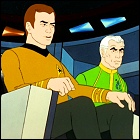 The final episode of the animated Star Trek‘s second season, The Counter-Clock Incident, premieres on NBC. This is the only Star Trek television episode to mention Captain Robert April, the name originally envisioned by Gene Roddenberry for the captain of the Enterprise.
The final episode of the animated Star Trek‘s second season, The Counter-Clock Incident, premieres on NBC. This is the only Star Trek television episode to mention Captain Robert April, the name originally envisioned by Gene Roddenberry for the captain of the Enterprise.
Star Trek: How Sharper Than A Serpent’s…
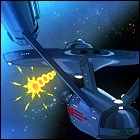 The fifth episode of the animated Star Trek‘s second season, How Sharper Than A Serpent’s Tooth, premieres on NBC.
The fifth episode of the animated Star Trek‘s second season, How Sharper Than A Serpent’s Tooth, premieres on NBC.
Star Trek animated: Albatross
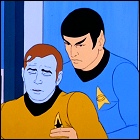 The fourth episode of the animated Star Trek‘s second season, Albatross, premieres on NBC.
The fourth episode of the animated Star Trek‘s second season, Albatross, premieres on NBC.
Star Trek animated: The Practical Joker
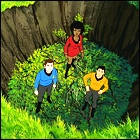 The third episode of the animated Star Trek‘s second season, The Practical Joker, premieres on NBC.
The third episode of the animated Star Trek‘s second season, The Practical Joker, premieres on NBC.
Star Trek animated: Bem
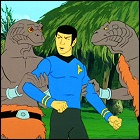 The second episode of the animated Star Trek‘s second season, Bem, premieres on NBC. The episode is written by The Trouble With Tribbles writer David Gerrold.
The second episode of the animated Star Trek‘s second season, Bem, premieres on NBC. The episode is written by The Trouble With Tribbles writer David Gerrold.
Star Trek’s second animated season begins
 The second season of the animated Star Trek series begins on NBC with the episode The Pirates Of Orion, written by Star Trek fan (and future Trek novelist) Howard Weinstein. The episode airs almost exactly eight years after the television premiere of the live-action Star Trek on NBC.
The second season of the animated Star Trek series begins on NBC with the episode The Pirates Of Orion, written by Star Trek fan (and future Trek novelist) Howard Weinstein. The episode airs almost exactly eight years after the television premiere of the live-action Star Trek on NBC.
Enterprise in drydock
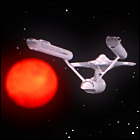 The 275-pound, 18-foot filming “miniature” of the starship Enterprise from Star Trek arrives at the Smithsonian, but it’s just as well that its planned display in the National Air & Space Museum won’t open until 1976: having suffered years of mishandling and barely-adequate storage at Paramount, with a final round of damage occurring during shipping, television’s most famous spaceship arrives in need of extensive repairs. Both of the round caps of the Enterprise’s warp engines are missing, and the intricate lighting setup built into the engines has been destroyed as a result, and the “radar dish” at the bottom of the model is missing as well. The Enterprise model will undergo extensive restoration and repainting for three months at the Smithsonian’s Maryland facility.
The 275-pound, 18-foot filming “miniature” of the starship Enterprise from Star Trek arrives at the Smithsonian, but it’s just as well that its planned display in the National Air & Space Museum won’t open until 1976: having suffered years of mishandling and barely-adequate storage at Paramount, with a final round of damage occurring during shipping, television’s most famous spaceship arrives in need of extensive repairs. Both of the round caps of the Enterprise’s warp engines are missing, and the intricate lighting setup built into the engines has been destroyed as a result, and the “radar dish” at the bottom of the model is missing as well. The Enterprise model will undergo extensive restoration and repainting for three months at the Smithsonian’s Maryland facility.
More about Star Trek in the LogBook
Hear about it on the Sci-Fi 5 podcast
The Enterprise’s new home?
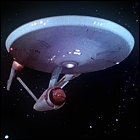 An agreement is struck between Paramount Pictures’ television division and the Smithsonian Air & Space Museum (currently the Smithsonian Air Museum, which is planning the grand opening of its space-related exhibits for the bicentennial year of 1976) concerning the 18-foot, 275-pound filming model of the Starship Enterprise from Star Trek. Since Paramount foresees no use for the gigantic “miniature”, the studio agrees to donate the model to the Smithsonian as an exhibit – provided the Smithsonian foots the $500 bill for shipping. The model was originally built by Howard Anderson Co. in 1964 for the first Star Trek pilot, The Cage, at a cost running into tens of thousands of dollars. The Smithsonian plans to restore and display the model in its Space and Life exhibit, though years later the Enterprise will be “demoted” to a display near the museum’s gift shop.
An agreement is struck between Paramount Pictures’ television division and the Smithsonian Air & Space Museum (currently the Smithsonian Air Museum, which is planning the grand opening of its space-related exhibits for the bicentennial year of 1976) concerning the 18-foot, 275-pound filming model of the Starship Enterprise from Star Trek. Since Paramount foresees no use for the gigantic “miniature”, the studio agrees to donate the model to the Smithsonian as an exhibit – provided the Smithsonian foots the $500 bill for shipping. The model was originally built by Howard Anderson Co. in 1964 for the first Star Trek pilot, The Cage, at a cost running into tens of thousands of dollars. The Smithsonian plans to restore and display the model in its Space and Life exhibit, though years later the Enterprise will be “demoted” to a display near the museum’s gift shop.
Star Trek animated: Jihad
 The 16th episode of the animated Star Trek series, Jihad, premieres on NBC. The episode is written by Stephen Kandel, the writer who created the popular Trek character Harry Mudd.
The 16th episode of the animated Star Trek series, Jihad, premieres on NBC. The episode is written by Stephen Kandel, the writer who created the popular Trek character Harry Mudd.
Star Trek animated: The Eye Of The Beholder
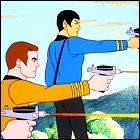 The 15th episode of the animated Star Trek series, The Eye Of The Beholder, premieres on NBC.
The 15th episode of the animated Star Trek series, The Eye Of The Beholder, premieres on NBC.
The U.S.S. Enterprise gets a toon-up
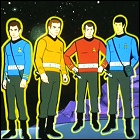 After years of denying that Star Trek had ever been a “kids show” like its prime-time rival Lost In Space, Gene Roddenberry agrees to NBC’s offer to restart the science fiction cult classic as an animated series, premiering on the seventh anniversary of the live-action show’s debut with the episode Beyond The Farthest Star. In the end, this series becomes the only iteration of the Star Trek franchise to win an Emmy Award for a non-technical (i.e. music, hairstyling, special effects) category.
After years of denying that Star Trek had ever been a “kids show” like its prime-time rival Lost In Space, Gene Roddenberry agrees to NBC’s offer to restart the science fiction cult classic as an animated series, premiering on the seventh anniversary of the live-action show’s debut with the episode Beyond The Farthest Star. In the end, this series becomes the only iteration of the Star Trek franchise to win an Emmy Award for a non-technical (i.e. music, hairstyling, special effects) category.
The first Star Trek convention
 A three-day event called Star Trek Lives! gets underway at the Statler Hilton in New York City, organized by a group of fans including Joan Winston and future Star Trek Compendium author Allan Asherman. A gathering of fans in the low hundreds is expected, but instead a crowd of thousands turn up to hear presentations by guest speakers such as Gene and Majel Roddenberry, Isaac Asimov, former Desilu executive Oscar Katz, and Star Trek writer and script editor D.C. Fontana, as well as presentations by guests representing NASA. (Roddenberry will later claim that NBC executives were present as well, though he claims they declined to identify themselves to fans since there was a fair amount of anti-NBC sentiment expressed in the wake of Star Trek’s cancellation.) Though science fiction conventions have been held prior to this event, this is the first dedicated Star Trek convention, and indeed the first such gathering devoted to a single property.
A three-day event called Star Trek Lives! gets underway at the Statler Hilton in New York City, organized by a group of fans including Joan Winston and future Star Trek Compendium author Allan Asherman. A gathering of fans in the low hundreds is expected, but instead a crowd of thousands turn up to hear presentations by guest speakers such as Gene and Majel Roddenberry, Isaac Asimov, former Desilu executive Oscar Katz, and Star Trek writer and script editor D.C. Fontana, as well as presentations by guests representing NASA. (Roddenberry will later claim that NBC executives were present as well, though he claims they declined to identify themselves to fans since there was a fair amount of anti-NBC sentiment expressed in the wake of Star Trek’s cancellation.) Though science fiction conventions have been held prior to this event, this is the first dedicated Star Trek convention, and indeed the first such gathering devoted to a single property.
Star Trek: from syndication to… popularity?
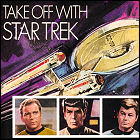 Picked up in syndication by Kaiser Broadcasting’s station group and other independent TV stations across America – often those with no newscast of their own – Star Trek sees its ratings skyrocket. The Kaiser stations run it directly opposite local and network newscasts at 6:00pm in most markets. Paramount Television runs an ad in Broadcast Magazine, claiming that New York City independent station WPIX has shown a 96% gain in ratings over the previous programming in the same time slot. In Los Angeles, KCOP’s nightly Star Trek reruns boost ratings 77%. It is from this culture – the nightly reruns of the 79 episodes reaching saturation point – that Star Trek fandom truly arises, gradually leading to an outcry for new material that gets Paramount’s attention later in the ’70s. With most of the cast battling typecasting, the conventions prove to be a lucrative draw for the show’s stars (and creator Gene Roddenberry, who becomes a popular speaker at conventions).
Picked up in syndication by Kaiser Broadcasting’s station group and other independent TV stations across America – often those with no newscast of their own – Star Trek sees its ratings skyrocket. The Kaiser stations run it directly opposite local and network newscasts at 6:00pm in most markets. Paramount Television runs an ad in Broadcast Magazine, claiming that New York City independent station WPIX has shown a 96% gain in ratings over the previous programming in the same time slot. In Los Angeles, KCOP’s nightly Star Trek reruns boost ratings 77%. It is from this culture – the nightly reruns of the 79 episodes reaching saturation point – that Star Trek fandom truly arises, gradually leading to an outcry for new material that gets Paramount’s attention later in the ’70s. With most of the cast battling typecasting, the conventions prove to be a lucrative draw for the show’s stars (and creator Gene Roddenberry, who becomes a popular speaker at conventions).
More about Star Trek in the LogBook
Hear about it on the Sci-Fi 5 podcast
NCC-1701-UK
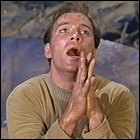 Picked up by the BBC as a summer replacement for Doctor Who, which has just ended its sixth season with the departure of its entire cast, Star Trek begins its run on BBC1 with the episode Where No Man Has Gone Before, the series’ second pilot. Sally Kellerman (M*A*S*H) and Gary Lockwood (2001) guest star. The initial episodes of the series’ UK run are aired in black & white, as BBC1 will not broadcast in color until November 1969.
Picked up by the BBC as a summer replacement for Doctor Who, which has just ended its sixth season with the departure of its entire cast, Star Trek begins its run on BBC1 with the episode Where No Man Has Gone Before, the series’ second pilot. Sally Kellerman (M*A*S*H) and Gary Lockwood (2001) guest star. The initial episodes of the series’ UK run are aired in black & white, as BBC1 will not broadcast in color until November 1969.
Star Trek: Turnabout Intruder
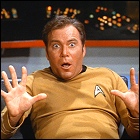 The 79th episode of Gene Roddenberry’s science fiction series Star Trek airs on NBC. This was the final episode produced or broadcast; Gene Roddenberry, having caught the meaning of the series’ move to a Friday night “death slot,” had already moved on to greener pastures without making arrangements for another fan protest for Star Trek’s renewal.
The 79th episode of Gene Roddenberry’s science fiction series Star Trek airs on NBC. This was the final episode produced or broadcast; Gene Roddenberry, having caught the meaning of the series’ move to a Friday night “death slot,” had already moved on to greener pastures without making arrangements for another fan protest for Star Trek’s renewal.
More about Star Trek in the LogBook
Hear about it on the Sci-Fi 5 podcast
Star Trek: from cancellation to syndication
 Having completed its purchase of Desilu Studios, Paramount runs the first print advertisement in Vol. 76, Issue 12 of Broadcasting Magazine, offering Star Trek reruns in syndication. Even though the last episode has yet to air on NBC, it is perhaps telling that the ad promises a set number of “79 episodes of constant quality, now being seen in over 65 countries around the world” – confirmation that there will be no further episodes beyond the current season.
Having completed its purchase of Desilu Studios, Paramount runs the first print advertisement in Vol. 76, Issue 12 of Broadcasting Magazine, offering Star Trek reruns in syndication. Even though the last episode has yet to air on NBC, it is perhaps telling that the ad promises a set number of “79 episodes of constant quality, now being seen in over 65 countries around the world” – confirmation that there will be no further episodes beyond the current season.
Star Trek: All Our Yesterdays
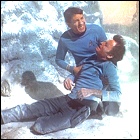 The 78th episode of Gene Roddenberry’s science fiction series Star Trek airs on NBC. Ian Wolfe and Mariette Hartley guest star. The last episode of Star Trek is aired months later with little fanfare.
The 78th episode of Gene Roddenberry’s science fiction series Star Trek airs on NBC. Ian Wolfe and Mariette Hartley guest star. The last episode of Star Trek is aired months later with little fanfare.
Star Trek: The Savage Curtain
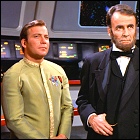 The 77th episode of Gene Roddenberry’s science fiction series Star Trek airs on NBC. Lee Bergere and Barry Atwater guest star. This episode features the last Klingon seen in the original series.
The 77th episode of Gene Roddenberry’s science fiction series Star Trek airs on NBC. Lee Bergere and Barry Atwater guest star. This episode features the last Klingon seen in the original series.
Star Trek: The Cloudminders
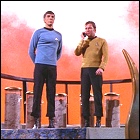 The 76th episode of Gene Roddenberry’s science fiction series Star Trek airs on NBC. Jeff Corey guest stars.
The 76th episode of Gene Roddenberry’s science fiction series Star Trek airs on NBC. Jeff Corey guest stars.
Star Trek: The Way To Eden
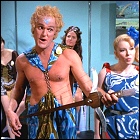 The 75th episode of Gene Roddenberry’s science fiction series Star Trek airs on NBC. This infamously “hippie themed” episode guest stars Charles Napier.
The 75th episode of Gene Roddenberry’s science fiction series Star Trek airs on NBC. This infamously “hippie themed” episode guest stars Charles Napier.
The Enterprise runs aground
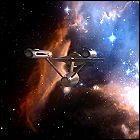 NBC announces that it is dropping Star Trek from the fall 1969 network schedule. Having taken the show’s Friday night “death slot” as a sign of things to come, Gene Roddenberry has already begun seeking greener pastures, leaving the day-to-day showrunner duties to Fred Freiberger. Roddenberry also has no plans to manipulate fan protests against the cancellation this time (as he had done in 1967 and 1968); some NBC publicity and promotions executives are surprised when the seemingly inevitable backlash fails to materialize.
NBC announces that it is dropping Star Trek from the fall 1969 network schedule. Having taken the show’s Friday night “death slot” as a sign of things to come, Gene Roddenberry has already begun seeking greener pastures, leaving the day-to-day showrunner duties to Fred Freiberger. Roddenberry also has no plans to manipulate fan protests against the cancellation this time (as he had done in 1967 and 1968); some NBC publicity and promotions executives are surprised when the seemingly inevitable backlash fails to materialize.
Star Trek: Requiem For Methuselah
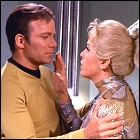 The 74th episode of Gene Roddenberry’s science fiction series Star Trek airs on NBC. This episode sees Spock use a version of a Vulcan mind-meld on Kirk, urging him to “forget”; the later movies will reveal that this memory manipulation technique has an opposite number: “remember”…
The 74th episode of Gene Roddenberry’s science fiction series Star Trek airs on NBC. This episode sees Spock use a version of a Vulcan mind-meld on Kirk, urging him to “forget”; the later movies will reveal that this memory manipulation technique has an opposite number: “remember”…
Star Trek: The Lights Of Zetar
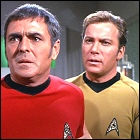 The 73rd episode of Gene Roddenberry’s science fiction series Star Trek airs on NBC. This episode is co-written by Shari Lewis, better known as the puppeteer behind Lambchop.
The 73rd episode of Gene Roddenberry’s science fiction series Star Trek airs on NBC. This episode is co-written by Shari Lewis, better known as the puppeteer behind Lambchop.
Star Trek: That Which Survives
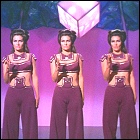 The 72nd episode of Gene Roddenberry’s science fiction series Star Trek airs on NBC. Lee Meriwether (Batman) guest stars.
The 72nd episode of Gene Roddenberry’s science fiction series Star Trek airs on NBC. Lee Meriwether (Batman) guest stars.
Star Trek: Let That Be Your Last Battlefield
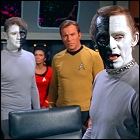 The 70th episode of Gene Roddenberry’s science fiction series Star Trek airs on NBC. Frank Gorshin (Batman) guest stars.
The 70th episode of Gene Roddenberry’s science fiction series Star Trek airs on NBC. Frank Gorshin (Batman) guest stars.
Star Trek: Whom Gods Destroy
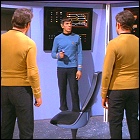 The 69th episode of Gene Roddenberry’s science fiction series Star Trek airs on NBC. Steve Inhat and Yvonne Craig guest star.
The 69th episode of Gene Roddenberry’s science fiction series Star Trek airs on NBC. Steve Inhat and Yvonne Craig guest star.
Star Trek: Elaan of Troyius
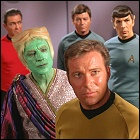 The 68th episode of Gene Roddenberry’s science fiction series Star Trek airs on NBC. France Nuyen guest stars.
The 68th episode of Gene Roddenberry’s science fiction series Star Trek airs on NBC. France Nuyen guest stars.
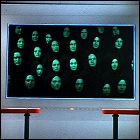 The
The